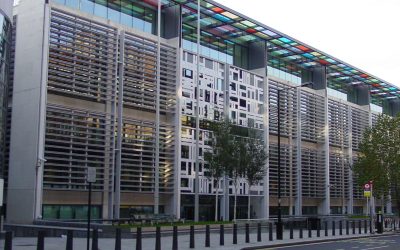Council tax: ‘Our logo is on the bill but we’re not getting the funding’
Funding for police and crime commissioners (PCCs) now takes up a greater proportion of many council tax bills than funding for the council issuing the bill, new analysis reveals.
The finding comes from a survey of district councils – the tier of government responsible for collecting council tax across a vast swathe of England. It raises questions about the resources available to provide universal local services including waste collection, leisure and environmental services, all overseen by district councils.
For 89% of the district councils that responded, the size of their precept has been overtaken by that of the PCCs.
The District Councils’ Network survey also revealed 77% of district councils are increasing council tax by the maximum possible amount, or very close to it.
The average increase in district council bills is only 10p a week.
District councils were only allowed to increase their council tax bills by 3% (or £5 a year per household, whichever is higher). In comparison, other types of authorities were able to increase bills by a higher amount.
Average increases, according to DCN’s survey:
-
- District councils: 2.6% (£5.14 a year)
- County councils: 4.7% (£69.20)
- PCCs: 5.7% (£14.64)
- Parish councils: 5.8% (£3.80)
- Fire and Rescue Authorities: 6.0% (£4.62)
DCN’s sample – based on 74 responses, representing 43% of districts setting council tax for 2023-24 – suggests the breakdown of council tax bills in shire county areas means a small fraction goes on the most noticeable universal local services. The shares are:
- County council 71.5%
- PCC 12%
- District council 9.4%
- Fire and rescue authority 3.9%
- Town/parish council 3.2%
The survey also revealed how behaviour change brought about by the pandemic continues to hit the income of many district councils:
- 47% of councils’ income from sales, fees and charges remains well below pre-Covid levels (90% or less)
- For nearly 10% of councils, income from sales, fees and charges is less than 75% of pre-Covid levels.
- Just 13% said their income from sales, fees and charges was at or above pre-Covid levels.
Cllr Peter Fleming, District Councils’ Network finance spokesman, said:
“Council tax bills may be sent out by districts and carry your district council’s logo but district councils are getting an ever lower proportion of the revenue they raise, with a devastating impact on the services that matter the most to residents and are provided to everyone.
“While county councils, the police and parish councils were permitted to increase their portions of bills by a far higher percentage than district councils, our universal services are being starved of cash, with a below inflation cap on any increase, damaging our communities and our ability to steer are places through these difficult times.
“District councils offer exceptional value for money. For an average of about £200 in council tax a year, we collect waste, recycle, provide leisure centres and parks, run environmental health services to promote public safety, plan the economic development of our towns, and provide benefits and financial support targeted at the most vulnerable members of our communities.
“We are calling for extra financial freedom to compensate for our loss of revenue since the pandemic and to equip us to take the measures demanded by our communities. It cannot be right that we are prohibited from recovering the full costs of many of our services like planning or licensing in the charges we provide or have one hand tied behind our back as we seek to support residents who are priced out by short-let housing.”
Notes for editors:
The maximum permitted increases of council tax stipulated by the Department for Levelling Up, Housing & Communities are 3% for English councils, without a referendum taking place. However, councils with social care responsibilities – county councils, unitary authorities, London boroughs and metropolitan councils – can levy an additional 2% increase through a social care precept.
As an alternative to a percentage increase, district councils were allowed to raise bills by £5 a year – but DCN’s research showed this only provided extra money for a small proportion of councils.
Police authorities or police and crime commissioners could increase bills by £15 without a referendum taking place.





